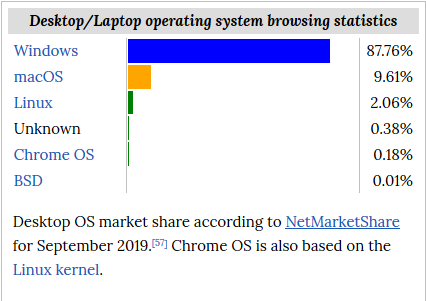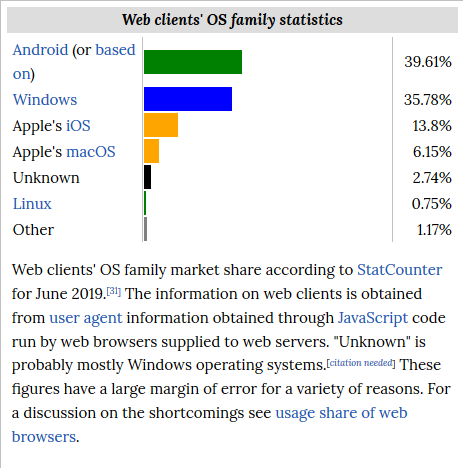I think that you are conflating a lot issues which means you can’t see that the GlassWire team are making good decisions here.
The following points mainly rely on one wikipedia article:
https://www.wikipedia.com/en/Usage_share_of_operating_systems
Edit: If anyone wants to discuss this issue further then I’ll move it to a new topic so requests by users asking for Linux / Max support aren’t swamped by longer topics about the wherefores and whys.
GlassWire is primarily aimed at end-user and endpoint devices and not for servers.
So GlassWire for Windows is not aimed at Windows Server but Windows Desktop. GlassWire can still run on Windows Server but that is a tiny minority of users.
You will find that Linux has a tiny marketshare for end-users hence it is a lower priority for the GlassWire team:

Source: https://www.wikipedia.com/en/Usage_share_of_operating_systems#/Desktop_and_laptop_computers
Linux distributions are primarily designed for servers. Desktop distributions are usually different.
Ubuntu is the best know distribution that separates server and desktop distributions.
If we look at server distributions, then Linux has dominant marketshare on web servers but most of those servers will never, ever be candidates to use GlassWire:

Source: https://www.wikipedia.com/en/Usage_share_of_operating_systems#/Public_servers_on_the_Internet
The priorities for GlassWire largely follow marketshare.
The priorities so far have been:
- Windows
- Android
- macOS
We can use web client marketshare statistics to indicate where they should be putting their focus:

Source: https://www.wikipedia.com/en/Usage_share_of_operating_systems#/Web_clients
Apple iOS has been bypassed despite having nearly 14% marketshare because of feature limitations:
Despite the feature limitations, GlassWire iOS will still be a better option than Linux.
Linux is way behind at about 1% markethshare so it is probably not worthwhile doing this unless the vast majority (e.g. more than 95%) of the coding is the same as the Android and/or macOS versions.
Along the way, Android web client numbers have passed Windows but a Windows version would probably still be the most attractive proposition to start first because of having greater control over features, licensing and pricing.
Linux-based does not mean able to run Linux applications
Application developers have to use many middleware APIs that are not Linux-compatible. So the application code differs between different Android-variants and different Linux-based variants. Being a Linux-based OS does not mean that it will run Linux applications, or vice-versa.
Here’s one example. The Chrome OS used on the Google Chromebook has increasing end-user marketshare and is Linux-based but has not guaranteed that it is able to run native Linux applications. The following link leads to a 2018 announcement of increasing compatibility but notice that this feature is being retrofitted:
https://www.wikipedia.com/en/Chromebook#/Integration_with_Linux
By the way, some marketshare statistics for Linux appear to include ChromeOS even though the applications have not been cross-compatible.